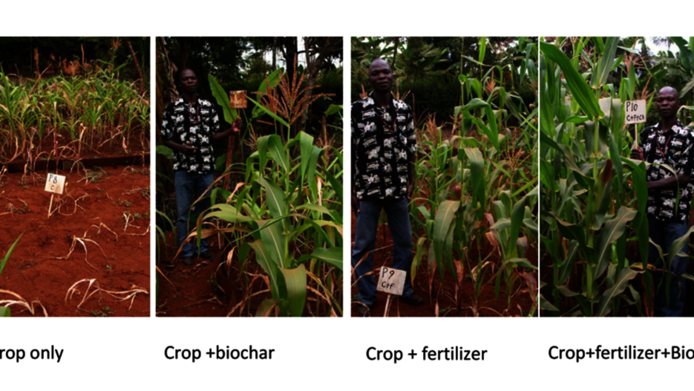Biochar improves crop growth and climate

In agriculture and in science, expectations for the benefits of biochar have been high in recent years. Modelled on the ancient practices of Amazonian farmers, charred biodegradable waste is used as fertiliser on arable land. Soils fertilised in this way have proven extremely fertile, just like the black earth – called terra preta – that has been found in several parts of the Amazon region.
First field trials
Initial testing in the laboratory confirmed that biochar made from organic matter such as wood off-cuts, straw, dung or kitchen scraps not only increases soil fertility, but also reduces greenhouse gas emissions, as carbon is trapped in the soil and prevented from escaping into the atmosphere. Rebecca Hood-Nowotny of the Austrian Institute of Technology (AIT) has exhaustively studied the “fertiliser of the future”, for the first time also analysing pilot field trials. In a recently concluded project, Hood-Nowotny, a holder of the FWF’s Elise Richter Fellowship, focused on the soil nitrogen cycle, which is also affected by biochar.
Biochar traps nitrogen
Cooperation with the International Institute of Tropical Agriculture (IITA) and AIT allowed Hood-Nowotny to carry out analyses of an experimental site of tropical soil in Kenya, as well as two sites in Lower Austria and Styria. She compared nitrogen cycles in both soil types with and without biochar addition, as well as with and without artificial fertiliser. For both tropical and temperate soils, Hood-Nowotny was able to prove that biochar addition increased nitrification rates and thatin tropical soils this led to greater nitrogen uptake by plants and enhanced growth. Moreover, she found that in all soils studied biochar addition decelerated the organic nitrogen cycle, as it appears the biochar protects organic matter from degradation by soil enzymes. Hood-Nowotny suspects that the large surface area and macro-pore structure of biochar provides favourable microhabitats for soil microbial biomass.
Efficient water management
As a consequence, nutrient and water retention is improved, stabilising the soil overall. As for mitigating climate change: tonnes of carbon are potentially locked up for decades and if more nitrogen remains in the soil, nitrous oxide emissions are reduced. “Our research has shown, for instance, that biochar improves water retention and plant water use efficiency in both soil types”, notes Hood-Nowotny. These are valuable insights when it comes to developing technological solutions for ensuring plant growth during droughts, she points out. Moreover, in Kenya’s tropical soils, biochar also has liming effects, which Hood-Nowotny says may explain the increase in nitrification rates.
Crop yields greater by 75 per cent
Field trials and greenhouse studies conducted as part of the FWF-funded project indicate that biochar combined with small quantities of inorganic fertiliser yielded the best results. In tropical soils, it increased crop yield by 75 per cent. “Biochar has an extremely positive impact on soil nutrient cycles – resulting in marked increases in grain yield, for instance. This holds particularly true for infertile tropical soils with low soil organic matter content”, Hood-Nowotny explains. Hood-Nowotny studies such biogeochemical processes using stable isotopes. These chemical elements serve to “label” the fertilizer or biochar, enabling researchers to track turnover processes, retention periods, or the molecular origins of certain substances in the soil.
Personal details Rebecca Clare Hood-Nowotny is a biogeochemist at the Austrian Institute of Technology (AIT). She qualified as a professor at the University of Natural Resources and Life Sciences, Vienna, in the field of forest and soil sciences. She is an environmental scientist and an expert on isotope analysis, and studies interactions between vegetation, climate and soil nitrogen and carbon cycles in order to investigate nature-based decarbonisation solutions.
Publications





